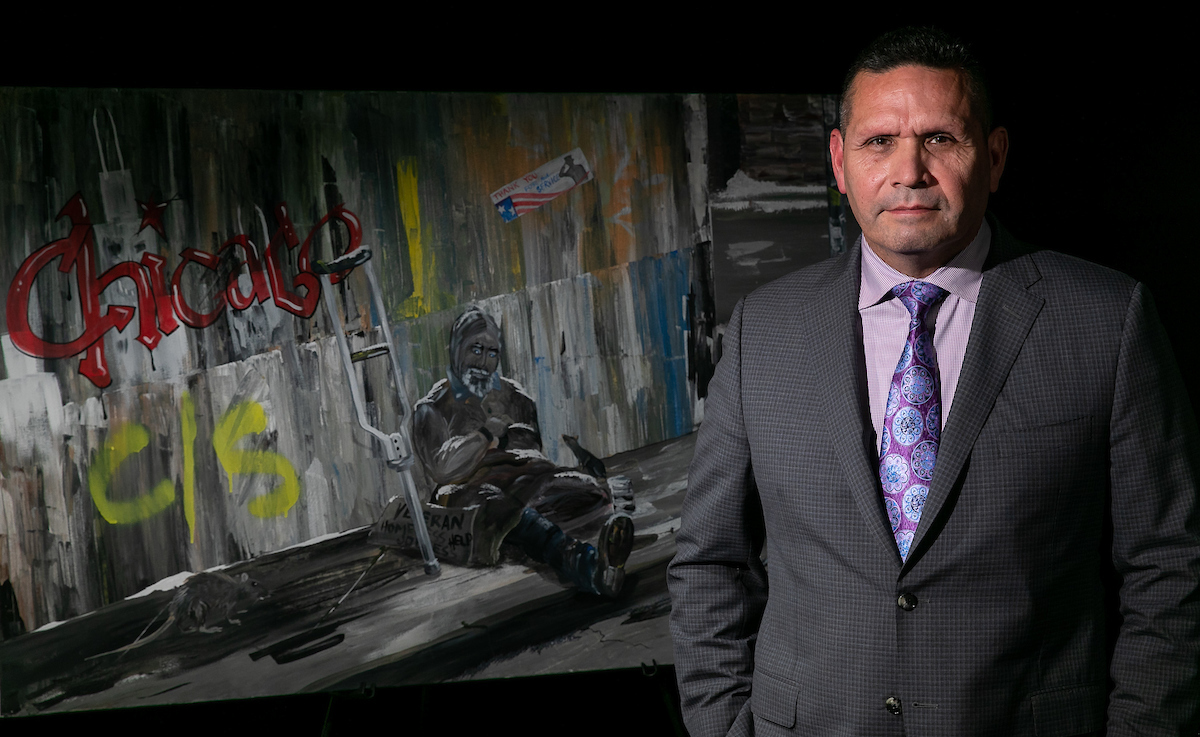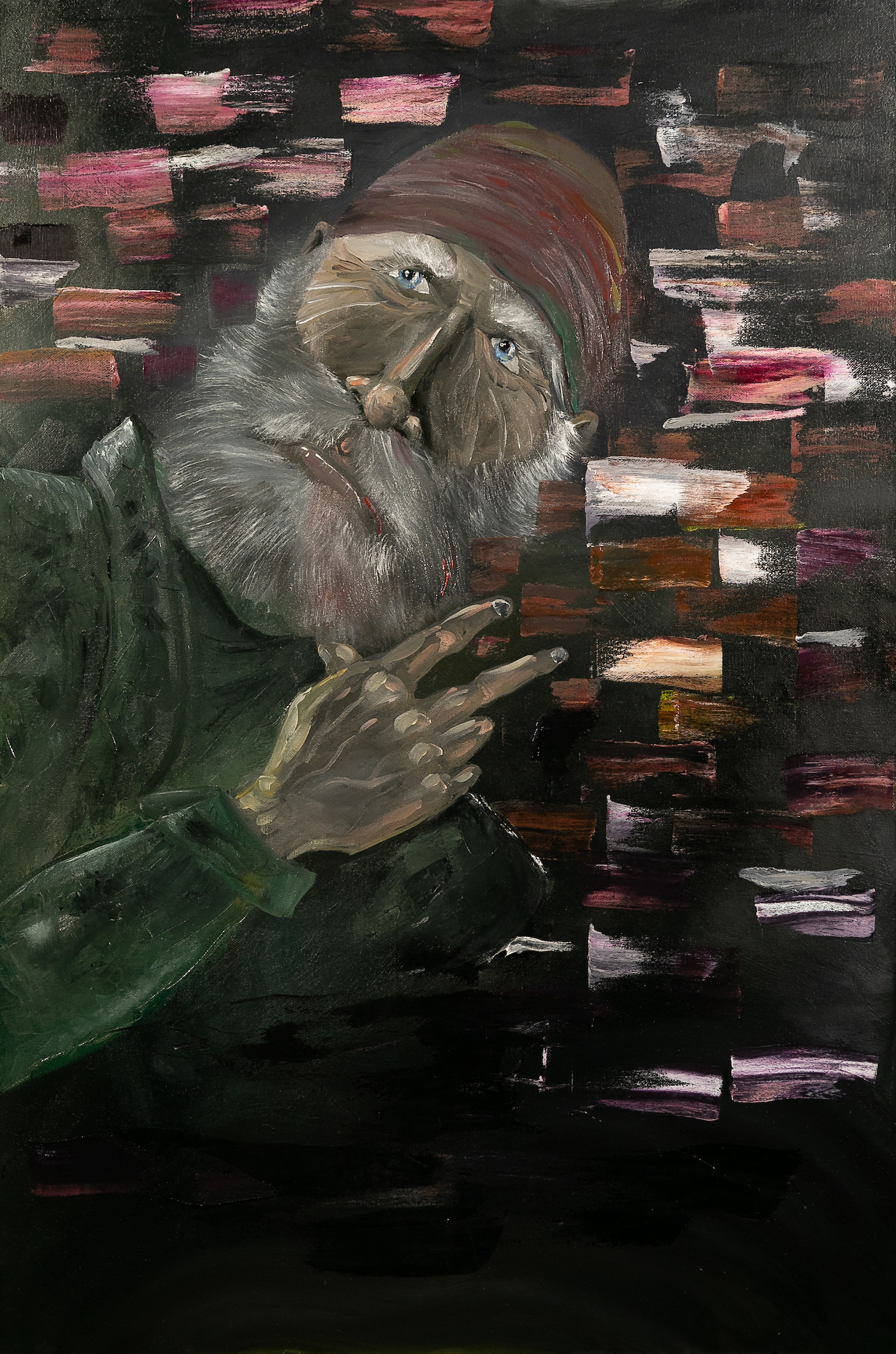 School for New Learning student and retired Master Gunnery Sgt. of the Marine Corps Mike Slaughter creates paintings, such as "Sarge," pictured above, that speak to the issue of armed services veterans reintegrating into society following military service. (DePaul University/Jeff Carrion)
School for New Learning student and retired Master Gunnery Sgt. of the Marine Corps Mike Slaughter creates paintings, such as "Sarge," pictured above, that speak to the issue of armed services veterans reintegrating into society following military service. (DePaul University/Jeff Carrion) Michael C. Slaughter, a Marine for 34 years and current DePaul student in the School for New Learning, is using art as a medium to reshape how we support our veterans.
With DePaul’s support and his own experiences reintegrating into society following a long military career and multiple deployments, Slaughter is shedding light on what is often our nation’s misunderstanding of those who risk their lives so we can live ours.
“As a reintegrating veteran, I am encountering a number of challenges,” says Slaughter, who is studying liberal arts with a focus on human resources. “As I navigate the educational system and the nuances of veteran reintegration, I’ve chosen to research, volunteer and work in and among areas that expose and explain some of the successes and failures of veteran reintegration.”
 "Unfinished Life" is the depiction of a weathered veteran that is missing something in his life. (DePaul University/Jeff Carrion)
"Unfinished Life" is the depiction of a weathered veteran that is missing something in his life. (DePaul University/Jeff Carrion)
Slaughter was a high-ranking marine as a Master Gunnery Sergeant, but his former rank has not made it any easier to transition back to civilian life. Although he was eager to contribute, employers and other community members had a hard time understanding his transferable skills, credentials and passion for something outside of the military.
“I have problem-solving skills and the ability to think quickly under pressure, which I think are valuable in civilian workplaces,” Slaughter says.
Veterans not only face an uphill battle finding rewarding employment after they serve, but also statistically are at higher risk for mental illness and suicide. According to the U.S. Department of Veterans Affairs, there are 21 military suicides every day. Slaughter sees this rate, along with homelessness and incarceration rates among veterans, as a failure of the support services offered.
In an attempt to capture the complicated lives of veterans, Slaughter took to canvas and painted “Sarge,” a remarkable vision of how veterans are often forgotten as they struggle to reintegrate into civilian society.
“Sarge is a once respected, now rejected veteran. His predicament is a byproduct of a number of issues: joblessness, hopelessness, rejection, lack of easy access to social and mental health care and depression,” Slaughter explains. “He is part of a group of people in society who exist in the background, and largely go unnoticed while people live their lives.”
Because of their invisibility, Slaughter says, suicide, homelessness, and incarcerated veteran rates fail to improve.
Derise Tolliver Atta, an associate professor in the School for New Learning and licensed psychologist, inspired Slaughter to paint, and through painting, “remember” himself. He chose to follow an impressionist style of painting because of a class taught by Sara Kimble, an associate professor in the School for New Learning, on "Impressionism and Post Impressionism in Chicago."
His professors’ interest and devotion to their craft led him to his current research interests, and other projects. “Sarge” has gained a lot of buzz, but it isn’t the only way Slaughter has promoted and supported veteran causes.
Slaughter helped introduce Veterans Affairs representatives from the Veterans Integration to Academic Leadership program to DePaul. VITAL serves the mental health needs of veteran students completing study at community college through post-baccalaureate degrees.
“I feel pretty good about all we have accomplished with VITAL in less than a year on-site,” Slaughter says. “There is obviously more to be built up, and I meet with the Office of Adult, Veteran and Commuter Student Affairs weekly about the programs and our plans to continue cultivating them in various ways.”
In addition to painting and VITAL, Slaughter recently worked on a project with veterans who are incarcerated at the Cook County Jail. As the incarcerated veterans wait for their cases to be adjudicated, Slaughter works with them to assess what led them to this point in their lives.
“This time can be used to explore the variables that contributed to their arriving at this point, and to work backwards to develop programming both inside the jail and outside with the Sheriff’s department to ensure the veteran’s path is righted,” he shares.
Slaughter’s goal is to look at incarcerated veterans as they are: individuals. By taking the time to really understand how a veteran landed in jail, it becomes clearer what that person might need in terms of support services and guidance for a better future. He calls this their ‘exit plan.’
“My goal is to assess and identify specific support needs of incarcerated veterans with mental health, work, fitness and community reintegration,” he says.
Slaughter credits a number of DePaul faculty and staff for inspiring and motivating him. How can DePaul community members better support veterans? Slaughter recommends sitting down and having a conversation.
“My request would be that you stop and have a conversation with as many people as you can and listen to them,” Slaughter says. “Share your perspective on veterans’ issues, too. It’s a diverse topic and people have a lot of different opinions about veterans and their reintegration - having conversations to understand where veterans are at and what they are capable of really helps.”
 "Once respected, Now rejected" is a depiction of a homeless veteran. (DePaul University/Jeff Carrion)
"Once respected, Now rejected" is a depiction of a homeless veteran. (DePaul University/Jeff Carrion)